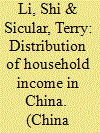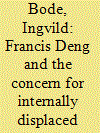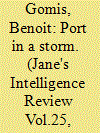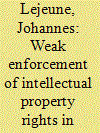| Srl | Item |
| 1 |
ID:
023486


|
|
|
|
|
| Publication |
Jan 2003.
|
| Description |
139-154
|
|
|
|
|
|
|
|
|
|
|
|
|
|
|
|
| 2 |
ID:
131947


|
|
|
|
|
| Publication |
2014.
|
| Summary/Abstract |
Income Theory
Public Distribution
China
Chinese Economy
Poverty
Politics
Social Reforms
Inequality
Gini Sufficient
Household Survey
Distribution Theory
Distribution Politics
Development Strategy
International Standard
Urbanization
Urban Poverty
Rural Poverty
|
|
|
|
|
|
|
|
|
|
|
|
|
|
|
|
| 3 |
ID:
130706


|
|
|
|
|
| Publication |
2014.
|
| Summary/Abstract |
Using the case of Francis Deng as representative of the Secretary-General for internally displaced persons as an example, this article considers how temporary civil servants may become intellectual leaders within the United Nations. During his 1992-2004 tenure, Deng managed to raise assistance and protection expectations for the internally displaced through framing their concerns in the concept of sovereignty as responsibility. He also contributed to legal change through formulating protection and assistance standards-the Guiding Principles on Internal Displacement. The article argues that a combination of three factors enabled him to exercise intellectual leadership. First, his insider-outsider position at the border between the UN Secretariat (the second UN) and the nongovernmental organizations, academic scholars, and independent experts who engage regularly with the UN (the third UN); second, his personal qualities; and third, his effective ways of framing at an opportune moment in time.
|
|
|
|
|
|
|
|
|
|
|
|
|
|
|
|
| 4 |
ID:
125571


|
|
|
|
|
| Publication |
2013.
|
| Summary/Abstract |
A spate of killings related to organised crime in 2013 has put the French port of Marseille in the spotlight. Benoit Gomis examines what has been done to combat the perceived issue, and what further measures are likely to be implemented by the city.
|
|
|
|
|
|
|
|
|
|
|
|
|
|
|
|
| 5 |
ID:
131609


|
|
|
|
|
| Publication |
2014.
|
| Summary/Abstract |
The effort to destroy Syria's chemical weapons program made little visible progress in May as none of the chemical weapons materials remaining in Syria were shipped out of the country for destruction.
Also last month, a team from the Organisation for the Prohibition of Chemical Weapons (OPCW) investigating allegations of chlorine attacks in Syria had to turn back from the site it was investigating and return to Damascus after it came under assault.
Under a schedule set last November by the OPCW Executive Council, the highest-priority chemicals among Syria's declared stockpile of 1,300 metric tons were to be shipped out of the country by Dec. 31 for destruction elsewhere. Most lower-priority materials were to be out by Feb. 5, and Syria was to destroy the rest of the material domestically
|
|
|
|
|
|
|
|
|
|
|
|
|
|
|
|
| 6 |
ID:
131643


|
|
|
|
|
| Publication |
2014.
|
| Summary/Abstract |
The discrepancy between de jure and de facto protection of intellectual property rights in China remains a heatedly debated topic. Unfortunately, political motivations have distorted the debate from its very beginning, which has not only resulted in a tendency for the different explanations to be played off against each other, but has also reinforced their specific flaws and biases. This study addresses these problems by advancing and integrating the three main explanatory frameworks for explaining the situation. The resulting integrated framework finds that structural factors such as bureaucratic fragmentation and political decentralization matter most in practical terms, but their durability cannot be understood without putting them into context. The findings also suggest that, contrary to most predictions, the future development of intellectual property protection in China might not follow the path laid down by other countries that have modernized in the past.
|
|
|
|
|
|
|
|
|
|
|
|
|
|
|
|